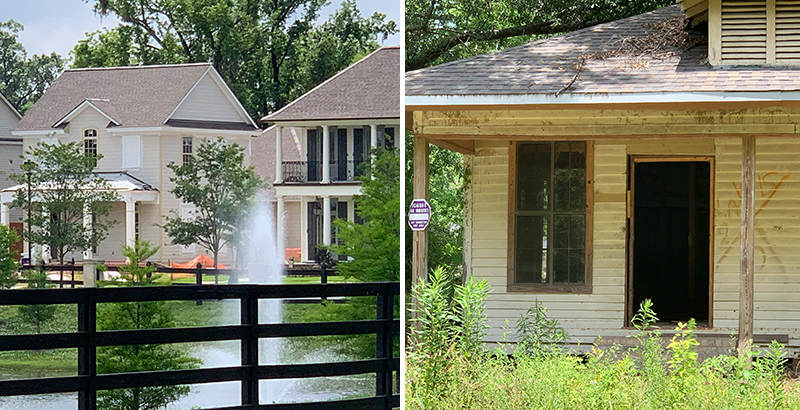With a Wealthy, Mostly White Suburb’s Vote to Withdraw, East Baton Rouge Schools a Step Closer to Fourth School Secession

A wealthy, largely white suburb of East Baton Rouge has taken a step closer to seceding from the city’s school district after residents voted to incorporate as a new municipality, St. George. If leaders of the new city succeed in pressing the Louisiana Legislature to create a new school system — the impetus for the years-long breakaway campaign — it will leave East Baton Rouge Parish Public Schools with a hyperconcentration of impoverished, mostly black students.
It would be the fourth time in 16 years that a Baton Rouge suburb has carved out its own district, taking over schools previously belonging to the parish, Louisiana’s equivalent of a county. Since the first three secessions, the district has shrunk to 42,000 students, 90 percent of them children of color and 84 percent impoverished.
The new city would be more than 70 percent white and less than 15 percent black. Up to 6,000 children could be forced to change schools.
“You can just look at the boundaries of what the community looks like, and it’s clear it’s rooted in racism,” said Tramelle Howard, vice president of the parish system school board. “It’s divisive.”
A slim majority — 54 percent — of the area’s 86,000 residents voted Oct. 12 voted to form St. George. Only those living within the city’s proposed boundaries were allowed to vote. The move, which would create the fifth-largest city in Louisiana, could still face a legal challenge. Assuming the new municipality is formed, it must petition lawmakers to create a new school district.
Estimates vary wildly, but a new St. George school district could take an estimated $85 million in state and local tax revenue and 12 percent of the current district’s student body. One civic group put the cost to the old district at $765 for every pupil left behind.
Add to that the potential financial impact of decisions that would need to be negotiated by parish and St. George officials, including which entity assumes responsibility for teacher pensions, retiree medical benefits and new or updated school buildings in a community where many facilities are crumbling.
“There are taxpayer investments that are already made,” said Howard.
According to the think tank EdBuild, 30 states allow school district secessions, which typically fuel financial and educational inequities. Since 2000, at least 128 U.S. communities have sought to leave their school districts, and 73 have succeeded.
“Our overreliance on property taxes to fund schools creates an incentive for the wealthiest communities to secede and keep their tax dollars for their children,” said Sara Hodges, EdBuild’s director of data and visualizations. “But the state of Louisiana has a safeguard to ensure that the needs of all communities are considered — it requires two-thirds of the legislature to vote yes for a new school district. The final decision will be in the hands of the legislature.”
The newspaper The Advocate reports that Gov. John Bel Edwards must now appoint an interim St. George mayor and city council so the new municipality can begin negotiations with East Baton Rouge, which has a merged city-parish government. The mayor-president of that entity, Sharon Weston Broome, had yet to say whether East Baton Rouge would challenge the breakaway in court.
The U.S. Department of Justice took Baton Rouge to court in 1956, two years after the Supreme Court’s landmark decision in Brown vs. Board of Education, and the city’s first court-ordered school integration began in 1963. This was followed by white flight and increased private school enrollment. In 2003, the desegregation case was closed. Within three years, three communities had seceded from East Baton Rouge Parish Public Schools to create their own districts.
In 2013, residents of the fastest-growing unincorporated section of the parish launched a campaign to get the legislature to put a constitutional amendment creating a new St. George school district on the ballot. After the measure failed, lawmakers told residents they would have a better chance at garnering a legislative majority if they first incorporated as a municipality.
In the intervening years, St. George’s backers broadened their arguments in favor of creating a new city to include the possibility of a leaner and more responsive local government. Detractors have presented counterarguments — not least that East Baton Rouge went to a unified system of government because it presented opportunities to reduce costs.
Earlier this year, Howard and other East Baton Rouge Parish Public Schools officials told The 74 that whether the breakaway ultimately takes place or not, the district is at a crossroads. A new superintendent will be hired in the coming months, and several board members said his or her top agenda items should be eliminating an inequitable divide between selective-enrollment magnet schools and poorly performing traditional campuses.
That needs to happen no matter what, Howard said in a new interview. But the formation of a new St. George district would make it harder.
“It’s unfortunate that a sector of the community believes that the only way to see progression is through division,” he said. “We just have to do the best for kids in our district.”
Get stories like these delivered straight to your inbox. Sign up for The 74 Newsletter

;)
